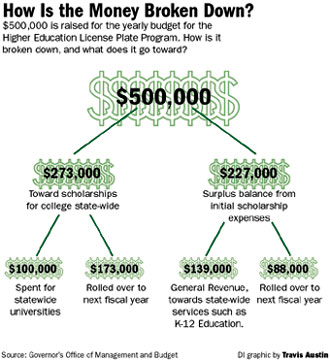Higher education funds jeopardized

Travis Austin
January 17, 2006
Although drivers sporting University or other special collegiate license plates in Illinois are told additional fees go entirely toward scholarships, some of the money is actually being spent on other state expenses.
Issued in 1999, the Higher Education License Plate Program provides scholarships to students who attend colleges and Illinois universities, according to the Illinois Student Assistance Commission.
“By purchasing these plates, you will be helping support scholarships for Illinois college students while displaying your pride for your favorite school or alma mater,” said Secretary of State Jesse White in the collegiate license plate brochure.
The debate over collegiate license plate funds focuses on the transfer of money, which some Republicans of the General Assembly believe, will allow fewer students to receive scholarships.
For each plate sold or renewed, $25 goes to the State College and University Trust Fund (for public schools) or the University Grant Fund (for private colleges), according to the Higher Education License Plate Grant Program.
Get The Daily Illini in your inbox!
In addition to the registration fee, the plates cost $40 to obtain and $27 extra to renew each year.
By the end of June 2006, $139,000 will have been transferred out of the collegiate license plate funds and put into the General Revenue Fund. Money in the Revenue Fund will support K-12 school programs, health care, job development and environmental programs throughout the state.
The Governor’s Office of Management and Budget spokesperson, Becky Carroll, said in order to address the state’s $5 billion budget deficit, one of many drastic measures taken by Blagojevich’s administration to cut the deficit was fund sweeping.
The collegiate license plate fund is one of more than 600 specialty funds the budget office looks at to determine if money could be moved without impacting any of the funds’ ability to meet their annual commitments and needs.
University spokesman Tom Hardy said the University uses the money received from the fund to provide $500 need-based scholarships to students.
“No existing scholarships were lost as a result of this fund sweep, but there was a potential that there could have been more scholarships if the money had been redistributed to colleges and universities,” Hardy said. “The University could always use more funds for need-based scholarships.”
For the collegiate license plate funds, the average balance during the last three years has been about $500,000 annually, Carroll said.
“Today, the appropriation is as much as $273,000, meaning that this is how much the General Assembly said that they can spend from that fund every year solely for scholarships,” Carroll said. “But only $100,000 is spent on scholarships for the last three years.”
However, of the $273,000 only $100,000 has been spent on scholarships in each of the past three years.
A portion of the remaining surplus balance of $227,000 will be swept to the General Revenue Fund, leaving the remaining balance of the $273,000 to roll over to the next fiscal year.
State Rep. Chapin Rose, (R-Mahomet), said fund sweeping from the collegiate license plate funds impacts the students who receive scholarships.
“From the collegiate license plates brochure, people are told that this money will go to a scholarship fund, but in fact, it is being stolen from and put into the state revenue treasury,” Rose said. “There are over 200 students who couldn’t get a scholarship … to claim that there is money left over means that there is no (financial) need (for students).”
He said in order to better inform the public, the administration should revise the collegiate license plate brochure to include a statement on what percentage of the money from these funds will go toward scholarships.
State Rep. Naomi Jakobsson, (D-Urbana), said because of the tough decisions to sweep funds, significant budget cuts to humans services and education were avoided.
“Despite facing a multi-billion deficit, we were able to hold the University stable,” she said.
If the University’s budget was cut, there would be job losses and fewer classes offered to students, Jakobsson said.






